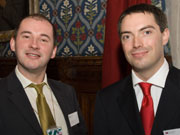The MP-Scientist Pairing Scheme aims to build bridges between some of the best research workers in the country and members of parliament, and help practising scientists understand the pressures under which MPs operate.
To this end the scientist spends a week in Westminster and the MP reciprocates by visiting the scientist’s department and laboratory. To date over 100 scientists and MPs have taken part.
Dr Nic Shannon, the physicist who was paired with Williams, said: “The week in Westminster was one of the busiest and most interesting of my life. I learnt more about how government works in the first day than the last 30 years. I now hope to return the favour, showing our local MP something of what life is really like in a top UK science department.”
As well as being MP for Bristol West, Stephen Williams is the Liberal Democrat Shadow Minister for Higher and Further Education, and a member of the Education Select Committee in the House of Commons.
Williams will visit groups in the Physics Department studying ultra-low temperatures, nanophysics and elementary particles, as well as learning something about Dr Shannon’s research on advanced magnetic materials.
Dr Shannon explained: “Magnetic materials already form the basis of mass data storage in iPods and PC’s, and if we want to find new applications for them we need to know more about how they work. The magnetic atoms inside these materials are like little compass needles. They have to make decisions about which way to point, and sometimes they get confused about this, just like people. My research looks at how atoms in these ‘frustrated’ magnets work together to resolve that confusion.”
Professor Martin Rees, President of the Royal Society, added: “Science plays an increasingly important and prominent role in politics, and vice versa. For science to progress in the UK it is vitally important for there to be greater mutual understanding between scientists and parliamentarians. Decision-making and future planning will benefit from such synergy.”
